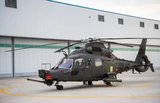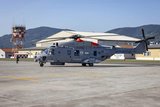Thales receives first LMM order for UK MoD
The UK Ministry of Defence (MoD) and Thales UK have agreed on a ‘re-role’ to allow the signing of the first production contract for the company’s Lightweight Multi-role Missile (LMM).
According to a statement released on 5 April, the company and the MoD have ‘re-directed’ funds from another project that Thales was previously contracted into, which was either of less importance than the LMM project or nearing completion.
The missile is being integrated in a maritime role as the Future Anti-Surface Guided Weapon Light (FASGW(L)) missile on the Royal Navy’s new Wildcat Lynx helicopter.
When asked if LMM had been deemed to be more important than the project the funds were being redirected from, a Thales spokesperson said that LMM was considered an essential capability. ‘It is sufficiently important to get it to this stage,’ the spokesperson told Shephard.
She said because the UK defence budget was ‘tight’, and the opportunity for new funding therefore difficult, the solution was an ‘innovative approach’ to finding money for important projects. However, the MoD did not wish the project that the funds were taken from to be publicly revealed.
Production for the MoD’s LMMs is due to start in 2012, with an initial delivery of 1,000 systems expected in 2013 and an in-service date of 2015.
The multi-role missile, which is being developed under the Team Complex Weapons (TCW) agreement, will enable the UK to have a single family of weapons that can take on different roles.
‘LMM is unique in that it’s the first lightweight weapon family to be specially designed to have a wide range of operational roles,’ David Beatty, managing director of Thales UK’s Belfast facility, where LMM will be manufactured, said.
‘The main [export] interest is coming from land, sea and air platform suppliers who are keen to have the lightweight, low cost and operational versatility that LMM can deliver.’
The TCW agreement between the MoD, MBDA, QinetiQ, Roxel and Thales UK was signed in 2006, with the purpose of providing an ‘innovative method’ for the MoD and industry partners to deliver the UK’s complex weapons.
Complex weapons are defined by the MoD as ‘tactical weapons reliant upon guidance systems to achieve precision effects’. They fall into five main categories: air-to-air; air defence; air-to-surface; anti-ship/submarine (including torpedoes); and surface-to-surface.
More from Defence Helicopter
-
![Germany to send WS-61 Westland Sea King helicopters to Ukraine]()
Germany to send WS-61 Westland Sea King helicopters to Ukraine
Germany has committed to sending Ukraine six of its 21 retiring WS-61 Westland Sea King multirole, amphibious helicopters.
-
![Boeing secures $271 million to advance modernisation of US Special Operations' MH-47G Chinook]()
Boeing secures $271 million to advance modernisation of US Special Operations' MH-47G Chinook
Boeing has clinched a major contract modification to further its backing of the US Special Operations Command’s MH-47G Chinook aircraft modernisation effort.
-
![Dubai Airshow 2023: South Korean homegrown helicopters make international debut]()
Dubai Airshow 2023: South Korean homegrown helicopters make international debut
Two KAI helicopters, the KUH-1E utility helicopter and the Light Attack Helicopter (LAH), have taken centre stage at the Dubai Airshow 2023.
-
![Italian Navy receives final NH90 helicopter]()
Italian Navy receives final NH90 helicopter
The Italian Navy now boasts a fleet of 56 NH90 helicopters comprising 46 SH-90As and 10 MH-90As.
-
![Argentina seeks AW109 and CH-46 Sea Knight helicopters]()
Argentina seeks AW109 and CH-46 Sea Knight helicopters
The Argentinian Air Force (FAA) and the Argentinian Naval Aviation Command (COAN) are looking for options to upgrade their helicopter fleets.
-
![DSEI 2023: Lockheed to produce about 40% of Black Hawks on UK soil if it wins NMH contest]()
DSEI 2023: Lockheed to produce about 40% of Black Hawks on UK soil if it wins NMH contest
Lockheed Martin promises a boost to the British job market and export opportunities, while strengthening ties with Poland and positioning the UK for a future in rotorcraft technology in the event of a New Medium Helicopter competition triumph.


























